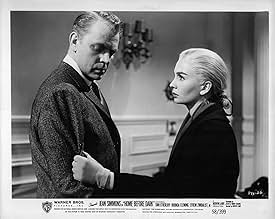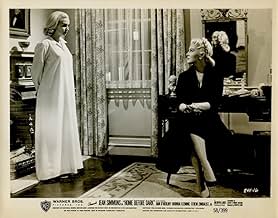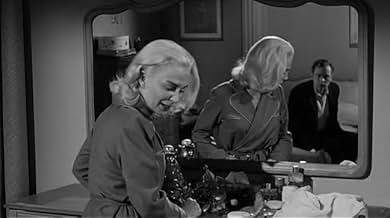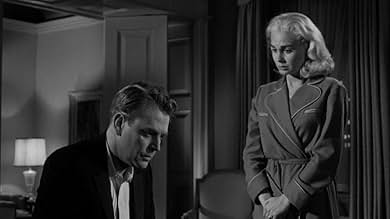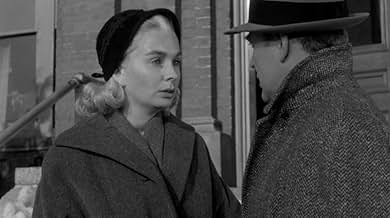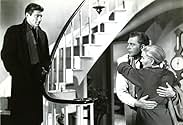IMDb रेटिंग
7.0/10
1.3 हज़ार
आपकी रेटिंग
अपनी भाषा में प्लॉट जोड़ेंSimmons is magnetic as Charlotte, her lovely, delicate face reflecting the inner turmoil of a woman battling for sanity after she walks out of a mental institution.Simmons is magnetic as Charlotte, her lovely, delicate face reflecting the inner turmoil of a woman battling for sanity after she walks out of a mental institution.Simmons is magnetic as Charlotte, her lovely, delicate face reflecting the inner turmoil of a woman battling for sanity after she walks out of a mental institution.
- पुरस्कार
- 4 कुल नामांकन
Stephen Dunne
- Hamilton Gregory
- (as Steve Dunne)
Walter Bacon
- Professor Dennison
- (बिना क्रेडिट के)
Fred C. Blau Jr.
- Male Patient
- (बिना क्रेडिट के)
Gail Bonney
- Mental Hospital Clerk
- (बिना क्रेडिट के)
Evelyn Clarke
- Receptionist
- (बिना क्रेडिट के)
Lillian Culver
- Mrs. Franklin
- (बिना क्रेडिट के)
Susan Davis
- Saleslady
- (बिना क्रेडिट के)
फ़ीचर्ड समीक्षाएं
I have seen many Jean Simmons' movies, and I thoroughly enjoyed this one.
I saw it as a young teenager on TV in Memphis, Tennessee, and it made quite an impression on me at the time. I haven't seen it since, but I still remember so many images from the movie. Not only was the acting excellent, I felt that I almost knew the characters personally. Jean Simmons was tremendous, as always. I have ordered other movies of hers, and have taped the ones from TV that I could.
The tone of the movie was also an important part of the story. As I recall, it was cold, winter, and filmed in Black and White, which gave it more of an impact. It's just occurred to me that since I saw it in b&w, I don't know if it was made in b&w, or if it was in color, since I was viewing it on a b&w TV. I think the starkness of the b&w made it very effective. I continue to look for it on TV and would LOVE to have a copy of this movie, if it ever becomes available! Donchu
I saw it as a young teenager on TV in Memphis, Tennessee, and it made quite an impression on me at the time. I haven't seen it since, but I still remember so many images from the movie. Not only was the acting excellent, I felt that I almost knew the characters personally. Jean Simmons was tremendous, as always. I have ordered other movies of hers, and have taped the ones from TV that I could.
The tone of the movie was also an important part of the story. As I recall, it was cold, winter, and filmed in Black and White, which gave it more of an impact. It's just occurred to me that since I saw it in b&w, I don't know if it was made in b&w, or if it was in color, since I was viewing it on a b&w TV. I think the starkness of the b&w made it very effective. I continue to look for it on TV and would LOVE to have a copy of this movie, if it ever becomes available! Donchu
Producer-director Mervyn LeRoy knows how to trail a false scent or two across this story; we receive hints of other films (Gaslight, for example, or almost any Hitchcock) and begin to wonder. Keeping us doubting, and keeping us outside the vulnerable and troubled main character, played superbly by Jean Simmons, we are left in a strange, low-key state of suspense right to the end. Is she mad, is she being manipulated for some nefarious end? Are her family conspirators or just unfeeling? If the latter, who is to blame? We want to rescue this character, we have in the story two likable men who seem to be candidates for white knights. Again, LeRoy manipulates our expectations of a melodramatic plot twist, a catharsis of the sort we have seen in those other films, in which all will be revealed. But, without spoiling the story, this is a different sort of film. Between the first scene and the second to last scene, we are held in a kind of suspended animation, together with the Simmons character. It is only very late in the film, however, that LeRoy lets the scales drop from our eyes.
Some may find the other family members too unsympathetic, early on especially. If there is a weakness in the formula, this is it. For me, the powerful sequence on Christmas Eve in Boston – the shopping jaunt, the party and the confrontation back at the hotel - settles such doubts as exist.
The ledger is more than balanced, in any case, by a good script, fine black and white photography, a convincing portrayal of a hidebound and catty faculty town (politics has nothing on academe), sensitive direction by LeRoy and, especially, Jean Simmons at her considerable best. This film deserves more admirers. It is that quietly spoken guest at the party who, if you spend some time listening, has more to say than the usual cinema windbags.
Some may find the other family members too unsympathetic, early on especially. If there is a weakness in the formula, this is it. For me, the powerful sequence on Christmas Eve in Boston – the shopping jaunt, the party and the confrontation back at the hotel - settles such doubts as exist.
The ledger is more than balanced, in any case, by a good script, fine black and white photography, a convincing portrayal of a hidebound and catty faculty town (politics has nothing on academe), sensitive direction by LeRoy and, especially, Jean Simmons at her considerable best. This film deserves more admirers. It is that quietly spoken guest at the party who, if you spend some time listening, has more to say than the usual cinema windbags.
This is a strong drama built entirely on Jean Simmons' outstanding performance as a woman recovering from a breakdown and searching for love and a home, only to find her own strength instead. Director Mervyn LeRoy and novelist/screenwriter Eileen Bassing confidently put the entire burden on Simmons, who appears in nearly every scene, and the actress delivers a character who continually defies and exceeds the expectations of those around her, and the viewer.
We meet Charlotte Bronn as she is returning from a long stay in a mental hospital following a nervous breakdown that included episodes of violence and paranoia. She's shaky and vulnerable and painfully self-aware. But even before she first appears at the end of the long hallway, walking towards the camera and into her new life, those closest to her have already begun to let her down.
We quickly begin to learn the source of her downfall, but Simmons doesn't give us a victim and the film doesn't back away from real mental illness- the portrayal of Charlotte's recovery and gradual tilt towards relapse is surprisingly sharp and modern.
"Home Before Dark" is understated, in an almost documentary style, more smart than clever, but the energy and pacing are crisp enough that the film always seems within one twist of becoming a noir thriller or Hitchcock suspense. Charlotte is desperate for acceptance, her husband's love, and the truth about her marriage, all of which are withheld, and we naturally expect a handsome man- any of several on hand- to step forward and solve her problems, either romantically or as a confidant. The film's value comes from its steady refusal to take those easy paths.
The pathos is tastefully understated but powerful nonetheless- Charlotte says she's not beautiful, she says she knows her husband doesn't love her and that she's not worthy of love- and her husband simply fails to contradict her. The film is, among other things, a relentless study of one spouse failing another.
We root for Charlotte Bronn as she stumbles- her story never does. This is one of Simmons' best.
We meet Charlotte Bronn as she is returning from a long stay in a mental hospital following a nervous breakdown that included episodes of violence and paranoia. She's shaky and vulnerable and painfully self-aware. But even before she first appears at the end of the long hallway, walking towards the camera and into her new life, those closest to her have already begun to let her down.
We quickly begin to learn the source of her downfall, but Simmons doesn't give us a victim and the film doesn't back away from real mental illness- the portrayal of Charlotte's recovery and gradual tilt towards relapse is surprisingly sharp and modern.
"Home Before Dark" is understated, in an almost documentary style, more smart than clever, but the energy and pacing are crisp enough that the film always seems within one twist of becoming a noir thriller or Hitchcock suspense. Charlotte is desperate for acceptance, her husband's love, and the truth about her marriage, all of which are withheld, and we naturally expect a handsome man- any of several on hand- to step forward and solve her problems, either romantically or as a confidant. The film's value comes from its steady refusal to take those easy paths.
The pathos is tastefully understated but powerful nonetheless- Charlotte says she's not beautiful, she says she knows her husband doesn't love her and that she's not worthy of love- and her husband simply fails to contradict her. The film is, among other things, a relentless study of one spouse failing another.
We root for Charlotte Bronn as she stumbles- her story never does. This is one of Simmons' best.
When the film begins, you learn that Charlotte Bronn (Jean Simmons) had been in a mental hospital for a year and was ready for discharge. Oddly, it also seems as if there's been no family therapy or plans for after discharge...a bit of a mistake in the film, I think, as I cannot imagine the hospital doing this. Apparently, Charlotte's husband, Arnold (Dan O'Herlihy) also had not visited her during this year AND he has no plans on changing the family structure which existed when Charlotte lost her mind and attacked her step-sister, Joan (Rhonda Fleming). Yet, oddly, she's discharged. I think it would have made more sense having the staff argue with Arnold and mention these problems---and he checked her out against medical advice. This portion of the movie could have been constructed better.
When Charlotte returns home, you can almost instantly see what drove her off the deep end. Her step-mother (Mabel Albertson) is god- awful--a controlling know-it-all who would have probably gotten Mother Theresa to attack her after being around her more than five minutes! Albertson made a career out of playing these awful mothers...and anyone who knows 60s TV will instantly recognize her. As for the step- sister, there are hints through the course of the movie that Joan and Arnold MIGHT be carrying on behind Charlotte's back...or at least Arnold simply didn't care that Charlotte might think this. He was certainly very cold and very distant throughout the film. In many, many ways, the story seems like a primer to teach family members how to keep mentally ill loved ones mentally ill or drive them over the edge. Is there any hope for poor Charlotte and this kooky bunch? And what about the new boarder, Jake (Efram Zimbalist Jr.)?
As I was at one time a mental health therapist, I see that the film has an excellent point to make. Returning to the exact same unhealthy environment is a sure way for disaster if you have psychological or addiction issues. Changing the family or leaving them entirely when they are resistant to change is something most decent therapists would consider working on with their clients as they face discharge. Because of this, I really appreciate the movie and it talks about things rarely talked about in films about mental illness. It's often NOT just the mentally ill person that is sick but the family structure.
As far as entertainment value goes, this film is very enjoyable and late in the film you really begin to wonder what is actually happening. Is Charlotte losing her mind or is Arnold trying to drive her over the edge...or both? My only quibble (other than the one mentioned in the first paragraph) is that the film went on too long and the portion consisting of them going to visit Harvard didn't seem to quite fit with the rest of the movie. Still, very compelling and different..and the very end was great.
When Charlotte returns home, you can almost instantly see what drove her off the deep end. Her step-mother (Mabel Albertson) is god- awful--a controlling know-it-all who would have probably gotten Mother Theresa to attack her after being around her more than five minutes! Albertson made a career out of playing these awful mothers...and anyone who knows 60s TV will instantly recognize her. As for the step- sister, there are hints through the course of the movie that Joan and Arnold MIGHT be carrying on behind Charlotte's back...or at least Arnold simply didn't care that Charlotte might think this. He was certainly very cold and very distant throughout the film. In many, many ways, the story seems like a primer to teach family members how to keep mentally ill loved ones mentally ill or drive them over the edge. Is there any hope for poor Charlotte and this kooky bunch? And what about the new boarder, Jake (Efram Zimbalist Jr.)?
As I was at one time a mental health therapist, I see that the film has an excellent point to make. Returning to the exact same unhealthy environment is a sure way for disaster if you have psychological or addiction issues. Changing the family or leaving them entirely when they are resistant to change is something most decent therapists would consider working on with their clients as they face discharge. Because of this, I really appreciate the movie and it talks about things rarely talked about in films about mental illness. It's often NOT just the mentally ill person that is sick but the family structure.
As far as entertainment value goes, this film is very enjoyable and late in the film you really begin to wonder what is actually happening. Is Charlotte losing her mind or is Arnold trying to drive her over the edge...or both? My only quibble (other than the one mentioned in the first paragraph) is that the film went on too long and the portion consisting of them going to visit Harvard didn't seem to quite fit with the rest of the movie. Still, very compelling and different..and the very end was great.
Charlotte (Jean Simmons) comes home from a mental hospital, shaky but game. She's been cured of all her delusions - that her husband and stepsister are having an affair, and conspiring behind her back. Except that her husband (Dan O'Herlihy) really does crave her stepsister (Rhonda Fleming) and they do talk about her in whispered tones. Even their new lodger (Efrem Zimbalist) can see it. But they deny it and she tries to deny it some more, to keep peace in the family. Finally, she can't. Is she having a breakdown or a breakout?
Admittedly, it is slow - the direction is cumbersome. But occasionally, it nails Eileen Bassing's novel with its stifling New England academic atmosphere and the rigidity of its codes. Jean Simmons was nominated for Best Actress in this role, and small wonder; it's one of her best this side of Elmer Gantry. Steve Dunne has an engaging appearance, and it's Rhonda Fleming who gets to be unsympathetic for a change.
If I could find the video, I'd buy it. But it's not for teenaged boys.
Admittedly, it is slow - the direction is cumbersome. But occasionally, it nails Eileen Bassing's novel with its stifling New England academic atmosphere and the rigidity of its codes. Jean Simmons was nominated for Best Actress in this role, and small wonder; it's one of her best this side of Elmer Gantry. Steve Dunne has an engaging appearance, and it's Rhonda Fleming who gets to be unsympathetic for a change.
If I could find the video, I'd buy it. But it's not for teenaged boys.
क्या आपको पता है
- ट्रिवियाSince this was a film by Warner Brothers, much of the soundtrack was stock and is the same as used in their 1942 film Now, Voyager (1942).
- गूफ़Arnold drives Charlotte home from the hospital in a snowstorm, when plenty of snow already covers the ground. At the film's conclusion, it's New Year's Eve and Charlotte mentions that she's been home for 3 months, which means that the snowstorm happened at the end of September.
टॉप पसंद
रेटिंग देने के लिए साइन-इन करें और वैयक्तिकृत सुझावों के लिए वॉचलिस्ट करें
- How long is Home Before Dark?Alexa द्वारा संचालित
विवरण
- रिलीज़ की तारीख़
- कंट्री ऑफ़ ओरिजिन
- भाषा
- इस रूप में भी जाना जाता है
- Bevor die Nacht anbricht
- फ़िल्माने की जगहें
- Marblehead, मैसाचुसेट्स, संयुक्त राज्य अमेरिका(Interior scenes and exterior scene filmed at 2 Union St. "The Layfayette House")
- उत्पादन कंपनी
- IMDbPro पर और कंपनी क्रेडिट देखें
बॉक्स ऑफ़िस
- बजट
- $13,90,000(अनुमानित)
- चलने की अवधि2 घंटे 16 मिनट
- रंग
- पक्ष अनुपात
- 1.78 : 1
इस पेज में योगदान दें
किसी बदलाव का सुझाव दें या अनुपलब्ध कॉन्टेंट जोड़ें


